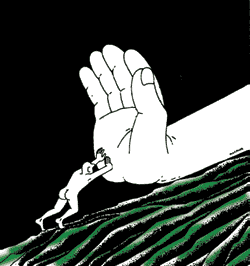 When Sher Bahadur Deuba ousted Girija Prasad Koirala after a long and bruising fight on 24 July, we wrote in this space that he did not need a political honeymoon period. But as it turned out, he got one anyway. Friends and foes alike have been kind to Deuba for the first 100 days of his second term as prime minister. Compared to the hand-to-hand combat of Girija's tenure, Deuba's four months have sailed by in relative serenity. The country is asleep, but at least there is peace.
When Sher Bahadur Deuba ousted Girija Prasad Koirala after a long and bruising fight on 24 July, we wrote in this space that he did not need a political honeymoon period. But as it turned out, he got one anyway. Friends and foes alike have been kind to Deuba for the first 100 days of his second term as prime minister. Compared to the hand-to-hand combat of Girija's tenure, Deuba's four months have sailed by in relative serenity. The country is asleep, but at least there is peace. The prime minister seems to have learnt from the mistakes of his first term, and moved with determination and purpose to fulfil his single-point agenda of resolving the Maoist crisis. Deuba can be stubborn when he wants to be, and he refuses to be distracted from the goal. That is why we get the feeling that everything else is on hold.
Remember the mood preceding Dasain last year when policemen were being butchered like buffaloes at the Kot, and compare it with this year's relative calm. True, there has been intimidation and violence by anti-Maoist village vigilantes, and Maoist counter-kidnappings of UML cadre. True, most MPs and local officials stayed in Kathmandu and did not go back to their constituencies for the holidays out of fear of being abducted. Also true that the government-Maoist talks seem to be stuck, and rebel cadre are itching for a fight. This being Nepal, even the peace talks took a breather during Dasain.
Still, despite it all, the truce has put a stop to the mindless violence of the past year in which 70 policeman were killed during some weeks in Maoist raids. It would be a sacrilege to the memory of the more than 2,000 Nepalis who have been killed by other Nepalis in the past six years if, after coming this far, we were to return to violence. The obscenity of the past cannot be allowed to be a rehearsal for even greater carnage in future.
Cutting through the posturing and rhetoric of both sides about the release of detainees, the third round of talks appears to be delayed because the Maoist leadership cannot decide on what to settle for. It has now taken the comrades nearly a month to prepare their bargaining position for substantive give-and-take on the question of power sharing.
Of the three agenda points, there is no way the government is going to give in on the first, the Maoist demand for a republic. That will have to remain a slogan for now. On the second demand for an interim government, there is a way out if the Maoists agree to emerge above ground and go into general elections. Deuba is even willing to consider an all-party national government to precede elections. On the third Maoist demand for a brand new constitution, the government says it is willing to consider a constitutional reform committee, while the Maoists want a constitutional assembly.
The Maoists need a face-saving way out to sell a future agreement to their own cadre. A constitutional review committee would be a compromise both could agree on. As far as we can tell, it is a question of semantics. We all agree the constitution needs tinkering. Let's not be hung up about this.
The clock is ticking for the Maoists, it is also in their interest to have a negotiated settlement. If they had settled three months ago, they may have got a constitutional assembly of sorts. Two months ago they may have got their national government. Today, the best they can hope for is perhaps a constitutional review committee.
But just as we were beginning to see the light at the end of the tunnel on the negotiations, what happens? Deuba's rivals in the party start getting fidgety because they don't want him to take all the credit for bringing peace. We are seeing an ugly repeat of last year's gnashing of internal Congress teeth. Party president Koirala has given derisive speeches accusing the prime minister of going soft on Maoists. His cousin and general secretary Sushil Koirala is making similar belligerent noises against his own colleagues in government.
Surprisingly-or maybe it is not so surprising-there is more support for Deuba's negotiating stance from the UML than from within his own party. UML's Madhav Kumar Nepal calls Maoists "terrorists". Even the Congress hasn't gone that far. Maoists are now targeting UML cadres at the grassroots for abductions. It could be they are testing the waters to field front candidates in local elections next year.
The opposition of the Koirala cousins to Deuba is understandable. But why are Deuba and his home minister, Khum Bahadur Khadka, having a slanging match in public? Deuba has sidelined the ambitious Khadka, and the home minister believes the prime minister is doing a solo on the Maoist negotiations.
So at a time when the ruling party needs to have a consensus on providing the Maoists a face-saving way out so the whole party can benefit from the peace dividend, we have this clawing and scratching going on. Just goes to prove our old axiom: the Nepali Congress is its own worst enemy.
Nepalis have extraordinary patience. But it is running out. And when the people lose their patience, neither the government nor the Maoists will be spared their wrath.


